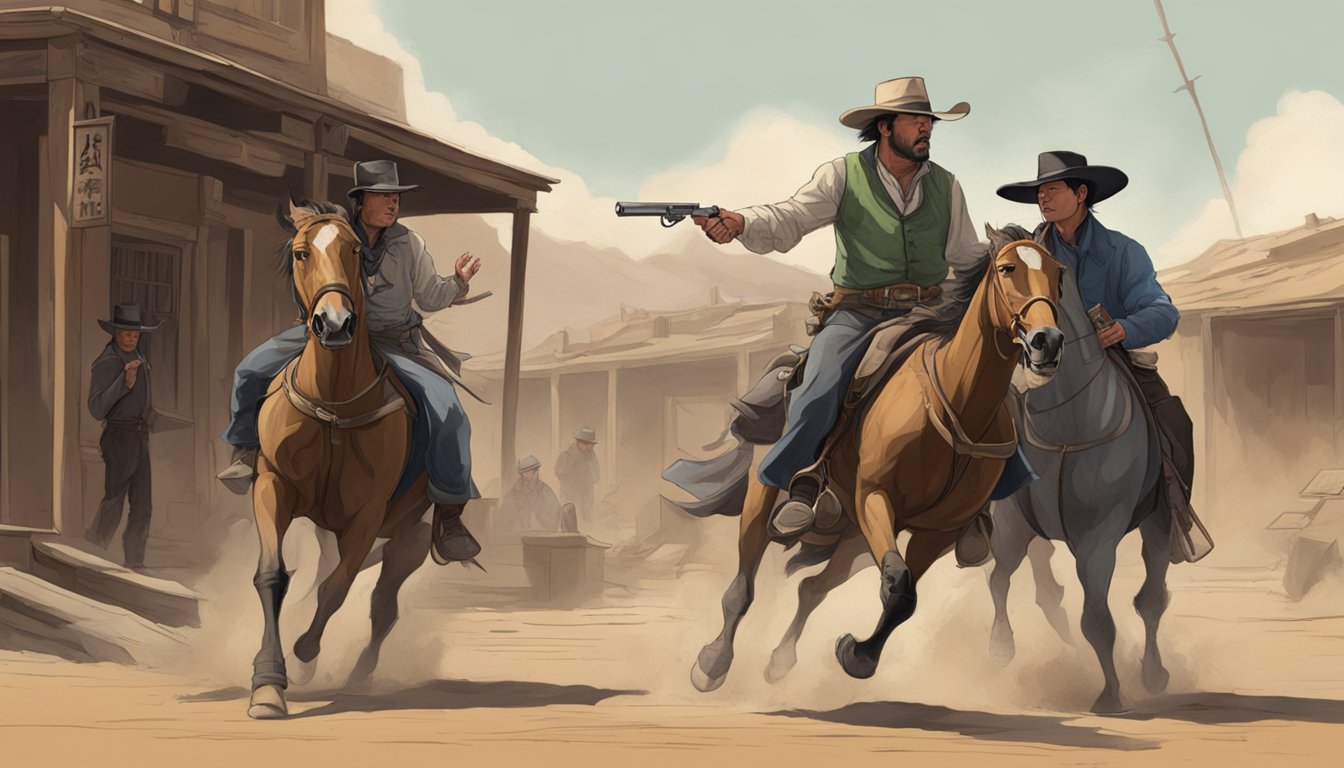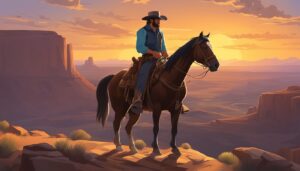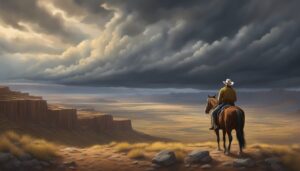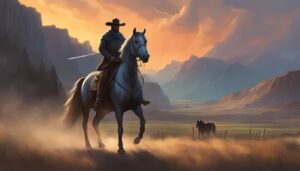Western heroes have captivated audiences for generations, and two modern characters stand out: John Dutton from “Yellowstone” and Chon Wang from “Shanghai Noon”. Both embody different aspects of the Western genre, offering unique perspectives on what it means to be a hero in the Wild West.
John Dutton, portrayed by Kevin Costner, is the patriarch of the Dutton family in “Yellowstone”. He fiercely protects his vast cattle ranch in Montana, facing threats from developers, politicians, and neighboring Native American tribes. Dutton’s unwavering commitment to preserving his family’s legacy and way of life makes him a formidable figure, albeit one with complex moral dimensions.
Chon Wang, played by Jackie Chan in “Shanghai Noon”, presents a different take on the Western hero. As an Imperial Guard from China thrust into the American frontier, Wang combines Eastern martial arts with Western cowboy skills. His fish-out-of-water story brings humor and fresh perspective to the genre, challenging traditional notions of what a Western hero can be.
Analysis of John Dutton as a Western Hero
John Dutton embodies a complex, modern take on the traditional Western hero archetype. His character in Yellowstone explores the evolution of power, family dynamics, and morality in the contemporary American West.
Character Development and Complexity
John Dutton, portrayed by Kevin Costner, is a multifaceted character who defies simple categorization. He displays traits of both a hero and an anti-hero, often blurring the lines between right and wrong.
His unwavering determination to protect his land and legacy drives his actions, sometimes leading to morally ambiguous decisions. This complexity adds depth to his character, making him more relatable and intriguing to viewers.
John’s past experiences have shaped his worldview and decision-making process. His character arc throughout the series reveals layers of vulnerability beneath his tough exterior, particularly in his relationships with his children.
John Dutton’s Patriarchal Role in the Dutton Family
As the patriarch of the Dutton family, John holds immense influence over his children: Beth, Jamie, Kayce, and John III. His leadership style is often authoritarian, expecting unwavering loyalty and obedience from his offspring.
John’s relationship with each child is unique and fraught with tension. He shares a special bond with Beth, who mirrors his ruthless determination. His complicated dynamic with Jamie stems from deep-seated trust issues and conflicting ambitions.
The patriarch’s efforts to groom his children for leadership roles on the ranch create both unity and discord within the family. John’s desire to preserve his legacy often clashes with his children’s individual aspirations and values.
John Dutton’s Quest for Control and Power Dynamics
John’s relentless pursuit of control over the Yellowstone Ranch drives much of the series’ conflict. His character explores the evolving power dynamics in the modern American West, where traditional ranching values clash with political and economic forces.
As a landowner, John wields significant influence in Montana. His political maneuvering, including his run for governor, showcases his strategic mind and willingness to adapt to maintain his grip on power.
John’s conflicts with external threats, such as developers and Native American tribes, highlight the complexities of land ownership and resource management in the contemporary West. His actions in these power struggles often challenge viewers’ perceptions of heroism and villainy.
The World of Yellowstone: Society and Setting

Yellowstone presents a stark, rugged landscape where modern conflicts collide with traditional ranch life. The series paints a vivid portrait of the American West, blending contemporary issues with timeless struggles for land and power.
Depiction of Ranch Life on the Yellowstone Ranch
The Yellowstone Ranch serves as the beating heart of the series. Sprawling across vast Montana terrain, it showcases the daily realities of modern ranching. Cowboys still ride horses and herd cattle, but now contend with corporate interests and changing economic landscapes.
Ranch hands face grueling work, from mending fences to branding livestock. The Dutton family’s commitment to preserving their way of life is evident in every aspect of ranch operations.
Technology and tradition coexist uneasily. Trucks and tractors share space with time-honored ranching techniques. This blend highlights the evolving nature of Western life and the challenges faced by those determined to maintain their heritage.
The Neo-Western Genre and the Duttons’ Saga
Yellowstone reinvents the Western for contemporary audiences. It tackles complex themes of family loyalty, political maneuvering, and environmental concerns within a familiar frontier setting.
The Dutton family’s struggle to maintain control of their land forms the core of this neo-Western narrative. John Dutton, portrayed by Kevin Costner, embodies the modern rancher-patriarch, navigating threats from developers, Native American tribes, and his own children.
Yellowstone’s success has spawned prequels like 1883 and 1923, expanding the Dutton saga across generations. These series explore the family’s history, providing context for their present-day battles and deepening the neo-Western mythology.
The show’s popularity has reignited interest in Western-themed entertainment, proving the genre’s enduring appeal when updated for modern sensibilities.
John Dutton’s Influence and Relationships

John Dutton’s complex web of relationships shapes the power dynamics in Yellowstone. His leadership style and personal connections drive much of the series’ conflict and drama.
Interpersonal Dynamics with Family Members
John’s relationships with his children are fraught with tension. Beth Dutton, his fiercely loyal daughter, acts as his ruthless enforcer. Jamie Dutton struggles to gain his father’s approval, leading to a strained father-son dynamic. Kayce Dutton, torn between family loyalty and his own path, maintains a complicated bond with John.
Monica Dutton, Kayce’s wife, often finds herself at odds with the Dutton patriarch. This creates additional strain within the family unit.
John’s connection with Rip Wheeler, his loyal ranch hand, is one of mutual respect and trust. Rip’s devotion to John borders on filial, highlighting the complexity of the Dutton family structure.
Alliances and Conflicts
John forms strategic alliances to protect his land and legacy. He navigates political waters, sometimes aligning with unexpected partners to fend off threats to the ranch.
His conflicts extend beyond family, encompassing rival ranchers, developers, and government officials. These battles showcase John’s tactical mind and willingness to push boundaries.
John’s environmental advisor and love interest, Summer, brings new challenges to his relationships. Her presence causes friction within the household, particularly with Beth.
Struggles and Leadership Challenges
John faces constant threats to his land and way of life. His leadership is tested as he balances traditional values with modern realities.
He grapples with health issues, adding a layer of vulnerability to his otherwise strong persona. This struggle impacts his decision-making and relationships with those around him.
John’s unwavering commitment to preserving the Yellowstone Ranch often puts him at odds with changing times. His leadership style, while effective, creates both loyalty and resentment among those in his orbit.
Evaluating Character Trajectories in Yellowstone

John Dutton’s character arc in Yellowstone showcases complex moral shifts and personal sacrifices. His journey reflects the series’ exploration of power, family, and legacy in the modern American West.
Assessing John Dutton’s Morality
John Dutton, portrayed by Kevin Costner, embodies the quintessential antihero in Yellowstone. His moral compass often wavers as he navigates threats to his ranch and family legacy.
In “Desire is all you need” (Season 5, Episode 9), John’s actions reveal the depths he’ll go to protect his interests. He makes morally questionable choices, blurring the lines between right and wrong.
John’s character development challenges viewers to reconsider traditional notions of heroism in the Western genre. His methods may be ruthless, but his motivations stem from a deep-rooted desire to preserve his way of life.
Narrative Arcs and Personal Sacrifices
Throughout Yellowstone, John Dutton’s narrative arc is marked by significant personal sacrifices. He consistently puts the needs of the ranch above his own well-being and relationships.
John’s dedication to the land often comes at the expense of his family bonds. This creates tension and conflict, driving the series’ dramatic storylines.
The aftermath of John’s decisions frequently leads to unforeseen consequences. These ripple effects shape not only his character but also the trajectories of those around him.
John’s willingness to sacrifice everything for the ranch adds depth to his character. It makes him a compelling and often polarizing figure in the Yellowstone universe.
Chon Wang: Shanghai Noon’s Eastern Western Hero

Chon Wang brings martial arts mastery and Chinese cultural values to the American Old West. His fish-out-of-water journey blends comedy with impressive action sequences.
Chon Wang’s Heroism and Skill Set
Chon Wang excels as an imperial guard from China, showcasing exceptional martial arts abilities. His acrobatic fighting style incorporates everyday objects as weapons, making him a formidable and resourceful hero.
Wang’s dedication to duty drives his quest to rescue Princess Pei Pei. This mission reveals his strong sense of honor and loyalty.
Despite language barriers, Wang adapts quickly to Western customs. He forms an unlikely partnership with Roy O’Bannon, demonstrating openness to new experiences and cultures.
Wang’s compassion extends beyond his immediate goals. He often helps strangers in need, embodying the heroic ideal of protecting the innocent.
Contrasts Between Chon Wang and John Dutton
Chon Wang and John Dutton represent distinct approaches to heroism in the American West. Wang, as an outsider, brings a fresh perspective and unique skillset to frontier challenges.
Dutton’s power stems from generational land ownership and local influence. Wang builds his reputation through individual actions and adaptability.
Both characters value family, but express it differently. Dutton fiercely protects his ranch legacy, while Wang’s familial duty motivates his initial journey.
Wang’s story embraces humor and fish-out-of-water elements. Dutton’s narrative tends toward gritty realism and intense family drama.
Their methods diverge significantly. Wang relies on martial arts and improvisation, while Dutton leverages political connections and cowboy skills.
The Legacy of the Dutton Family and the Ranch
The Dutton family’s legacy is deeply intertwined with their Yellowstone ranch, shaping both their personal lives and the Western genre. Their story explores themes of survival and the preservation of a way of life across generations.
Impact of the Duttons on the Western Genre
The Dutton saga in “Yellowstone” has significantly influenced modern Western storytelling. John Dutton, the family patriarch, embodies the classic cowboy archetype while facing contemporary challenges. His character bridges traditional Western values with present-day conflicts.
The show’s portrayal of ranch life and land disputes has reignited interest in Western dramas. It explores complex themes like family loyalty, political intrigue, and the clash between tradition and progress.
“Yellowstone” has spawned spin-offs like “1883” and “1923,” expanding the Dutton family history. These series provide a rich tapestry of Western American life across different eras.
Exploring Themes of Legacy and Survival
The Dutton family’s struggle to maintain their ranch is central to their legacy. John Dutton’s determination to preserve his land echoes the pioneering spirit of his ancestors.
Each generation faces unique challenges:
- Land encroachment
- Political pressures
- Family conflicts
The ranch symbolizes more than just property; it represents the Dutton’s identity and way of life. Their efforts to protect it highlight themes of survival and adaptation in changing times.
Family loyalty is a key aspect of the Dutton legacy. Despite internal conflicts, they unite against external threats. This dynamic explores the complexities of family relationships and the weight of inherited responsibilities.
Critical Reception and Cultural Impact

Yellowstone has garnered substantial acclaim and influenced American popular culture. The show’s portrayal of the modern West and complex characters has resonated with viewers and critics alike.
Yellowstone’s Popularity and Viewer Response
Yellowstone has become a ratings juggernaut for Paramount Network. The series consistently attracts millions of viewers each episode, making it one of cable television’s most-watched dramas. Fans praise the show’s authentic depiction of ranch life and the nuanced performances of its ensemble cast, particularly Kevin Costner as John Dutton. The series has sparked discussions about land ownership, family legacy, and the changing face of the American West.
Critics have largely responded positively to Yellowstone, commending its cinematography and storytelling. Some reviewers note the show’s ability to blend traditional Western themes with contemporary issues. The series has also faced criticism for its portrayal of Native American characters and occasionally melodramatic plotlines.
The Influence of Taylor Sheridan’s Vision
Taylor Sheridan’s creative direction has been instrumental in shaping Yellowstone’s success. His experience as a writer and director in the Western genre has lent authenticity to the show’s portrayal of modern ranch life. Sheridan’s focus on complex characters and morally ambiguous situations has set Yellowstone apart from traditional Westerns.
The series has sparked a renewed interest in Western-themed entertainment. Yellowstone’s popularity has led to spin-off series and increased demand for similar content. Sheridan’s distinctive style has influenced other productions, encouraging a grittier, more realistic approach to depicting the American West on screen.
Conclusion: Defining the Western Hero

John Dutton and Chon Wang represent two distinct interpretations of the Western hero archetype. Both characters embody core traits associated with the genre, yet each brings a unique perspective to the table.
John Dutton’s character in Yellowstone reflects a modern take on the traditional rancher. His unwavering dedication to preserving his family’s legacy and vast Montana ranch showcases the classic Western values of land stewardship and familial duty.
Chon Wang, on the other hand, offers a fresh spin on the Western hero. As an outsider navigating the American frontier, he brings a blend of Eastern wisdom and martial arts prowess to the Wild West setting.
Both characters demonstrate remarkable resilience in the face of adversity. Whether it’s John Dutton recovering from a near-fatal gunshot wound or Chon Wang adapting to an unfamiliar culture, these heroes exhibit the grit synonymous with the Western genre.
The storytelling approaches in Yellowstone and Shanghai Noon differ significantly. Yellowstone delves deep into the complexities of ranch life and family dynamics, while Shanghai Noon takes a more lighthearted, action-comedy route.
Ultimately, the Western hero archetype proves flexible enough to accommodate both traditional and innovative interpretations. John Dutton and Chon Wang each contribute to the evolution of this enduring character type, ensuring its relevance in contemporary entertainment.



